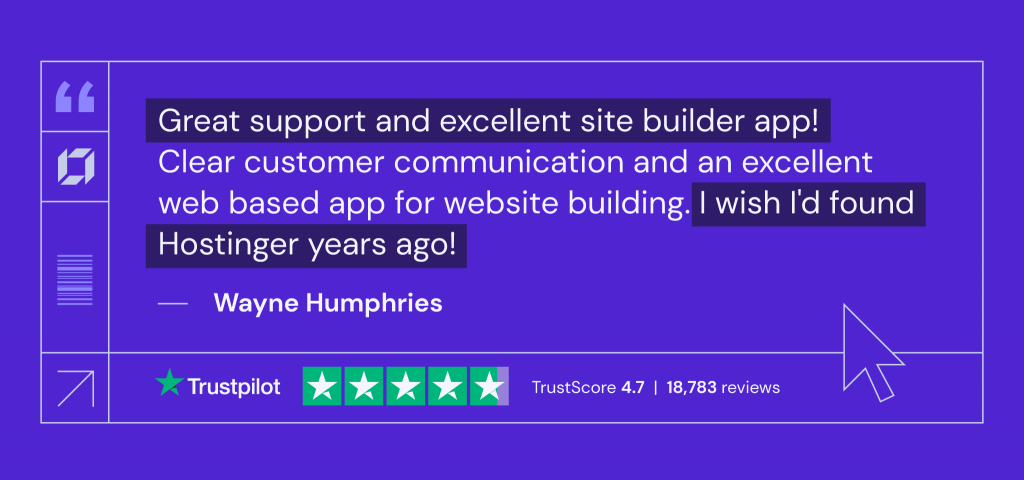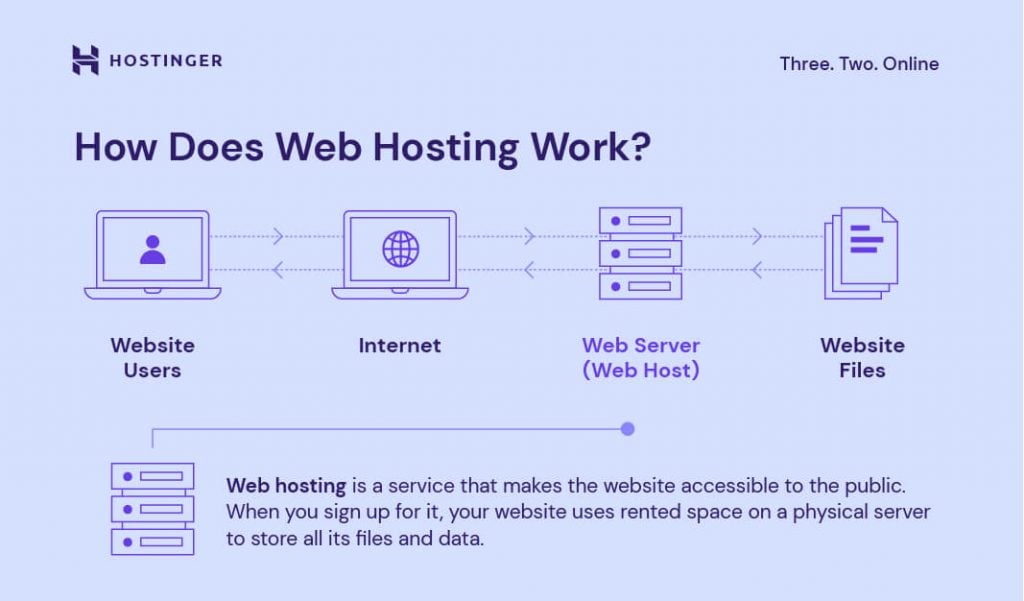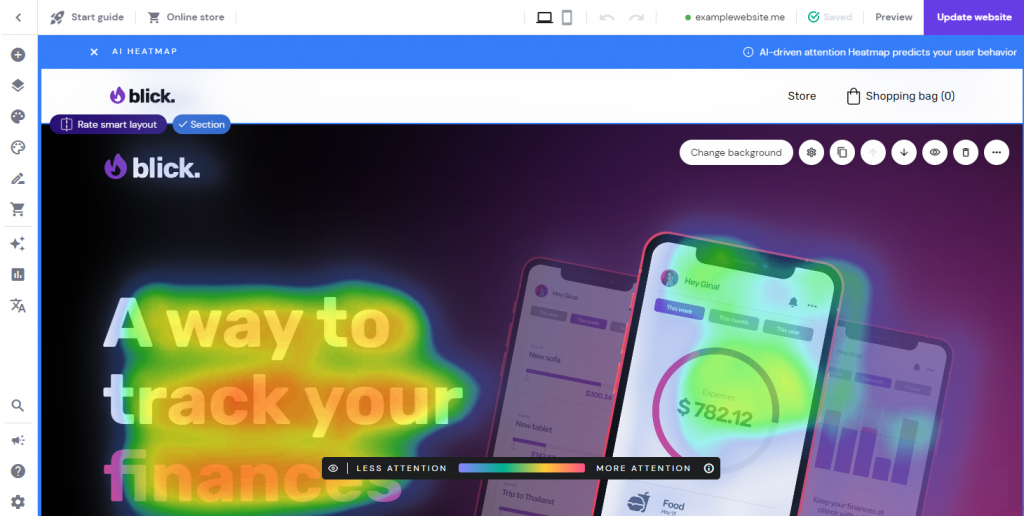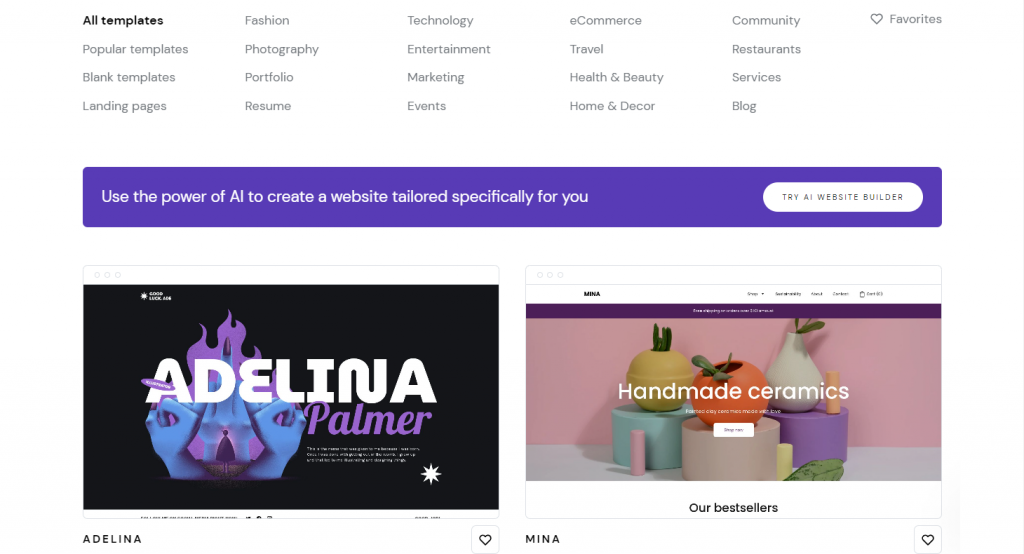Website Builder vs Web Hosting: The Difference in Features, Design, and Scalability
A website builder and web hosting are commonly used when creating a site. While both are important, only one is essential, while the other is an optional site creation method.
A website builder is an all-in-one platform that lets users create and publish web pages without coding. Meanwhile, web hosting is a service that stores users’ website files on a server to make them accessible online.
To help you understand better, we will compare a website builder vs web hosting in terms of their features, cost, customizability, and scalability. We will also explain how to choose between the two services.
Download website launch checklist
What Is a Website Builder
Website builders are tools that let users create a web page without writing code. They typically offer drag-and-drop functionality and various customizable HTML5 templates to help users easily build a website.
In addition, the best site builders already include a web hosting service that makes users’ web pages accessible online. As such, users don’t need to buy hosting separately.
Website builders are ideal for beginners due to their shallow learning curve and ease of use. Various platforms like Hostinger Website Builder, Wix, and Squarespace, are available with different features and prices.
What Is Web Hosting
Web hosting is a service that makes your website accessible on the internet.
While you can publish a website without a web host, it is not recommended for most users. That’s because it involves setting up a local computer to become a hosting server, which is costly and time-consuming.
The most convenient and common method to publish websites is with the help of a web hosting company.
When users buy this service from a web hosting provider, they rent a space on a server to store the site’s data. This host server is then responsible for processing web visitors’ requests and fetching the data required to display the site.
Unlike a builder platform, you can’t create a website only with a web hosting service. You must either make the website manually and upload the files to the host server or use a content management system (CMS) like WordPress.
There are many web hosting companies offering different types of hosting services. At Hostinger, you can choose from various web hosting plans, such as:
- Web Hosting. Multiple users share the same server resources for their websites, so it’s also known as shared hosting. This type of hosting is the most affordable option, ideal for small to medium-sized sites.
- Cloud-based web hosting. A website runs on multiple cloud servers instead of one physical server. Cloud hosting is suitable for high-traffic websites or web applications.
- Virtual server hosting. Users get a portion of dedicated resources from a physical server. This hosting type is a powerful solution for website owners wanting control and flexibility over their server settings.
- WordPress Hosting. WordPress hosting is a sub-category of standard web hosting that is specifically optimized for the CMS. It often comes with pre-installed plugins, such as LiteSpeed Cache.
Pro Tip
Between shared vs managed WordPress hosting, recommend the latter if you use the CMS. This type of CMS hosting handles your website’s backups, updates, and security audits, enabling you to focus on developing the front end.

Website Builder vs Web Hosting: The Main Differences
In this section, we will compare the difference between web hosting vs website builder. To help you easily distinguish the two, here’s a quick comparison table:
| Website Builder | Web Hosting | |
| Custom domain and email | Yes, depending on the provider | Yes, depending on the provider |
| Security | Managed by the provider | Depending on the hosting plan |
| Costs | All included in the subscription fee | Varies depending on your chosen web development method |
| Design and customizability | Limited to the provided templates and tools | More flexible using code and third-party extensions |
| Control of website | Partial control | Full control |
| Hosting scalability | Possible, depending on the provider | Possible |
| Best for | Beginners and small business owners | Users with some technical knowledge and medium to large-sized businesses |
Web Hosting vs Website Builder: Features
Since a website builder includes a web hosting service, they may share similar features. For example, Hostinger Website Builder offers a custom domain, professional email, free unlimited secure sockets layer (SSL) certificates, and 24/7 customer support. This is similar to our other hosting plans.
A site builder also has additional features and functionalities to support the website creation process. Hostinger Website Builder, for example, offers integrations with third-party software like Google Analytics and Hotjar.
Important! Website builders usually offer extensions that site owners can install to add more features, but the selection is less comprehensive than a CMS.
Meanwhile, different builders’ built-in features vary depending on the platform’s provider. At Hostinger, our website builder has a built-in search engine optimization (SEO) toolkit, eCommerce functionality, and AI-powered tools like the AI Heatmap.
On the other hand, since a web host lets you custom-code your website or use a CMS like WordPress, you have more flexibility to add new features. If you use a CMS, you can do so by installing a plugin, while for custom-coded websites, you must manually develop the features.
Due to its flexibility, purchasing a web hosting plan is more suitable than an all-in-one builder platform for websites needing custom or complex features. Meanwhile, a website builder is excellent for a small online store, blog, business website, or personal portfolio.
Learn More About Web Development
How to Make a Website
How to Host a Website
How to Design a Website
Web Design Best Practices
Web Hosting vs Website Builder: Cost
The cost of a web hosting service and website builder varies depending on the plans and providers. At Hostinger, all our hosting plans come with Hostinger Website Builder at no extra cost.
Prices start at $2.99/month and come with a free email, domain name, and unlimited SSL certificates. Since the builder is included, you get two services for the price of one.
Important! We don’t recommend using a completely free website builder as it often lacks features and doesn’t support a custom domain name. The free domain can make your website look unprofessional.
On the other hand, if you want to use a website creation method other than a builder, there will be added costs to make the website fully functional.
For example, although WordPress is free, you’ll need to purchase a hosting service, such as Hostinger’s WordPress Premium plan from $2.99/month. If you want to use premium plugins or themes, the total website costs will increase.
Meanwhile, unless you are experienced in site development, you may need to hire a web developer and graphic designer if you opt for a custom-coded website.
Other costs, like the domain name and SSL certificate, are included if you opt for a plan from Hostinger. However, this might not be the case with other web hosting providers, so you’ll need to purchase these services separately.
Web Hosting vs Website Builder: Design and Customizability
Site builders provide website templates that already have a functional layout, elements like headings and buttons, and navigation links. You can easily edit these templates according to your preferences with a drag-and-drop visual editor.
While simple to use, site builders do not let you code custom elements and have a more limited template selection compared to CMSs.
However, Hostinger Website Builder offers hundreds of templates for different site categories and has an AI website creation option. All you need to do is write a short description of the website, and the tool will generate a completely custom site from scratch.
Meanwhile, a web hosting provider lets you choose different methods to build your website. If you are using a CMS like WordPress, you can choose from over 10,000 themes in its official library or look for more options on third-party template marketplaces.
Alternatively, you can hire a web developer to build a custom-coded website from scratch. Since you have full control over its code, the website can have unlimited design customizability, which is great for enterprise-level projects.
Overall, a web hosting service offers more design and customization options than a website builder. Still, site builders offer sufficient design resources for those wanting to make a standard website.
Compare Website Builders With Other Development Methods
Website Builder vs WordPress
Website Builder vs Custom Website
Web Hosting vs Website Builder: Control and Scalability
Web hosting users can access and export their website files for optimization. For example, you can minify website files to improve loading speed or easily switch to a higher-performance hosting plan or even a different provider.
Having the option to upgrade your plan is important as you may need unlimited bandwidth when your website’s traffic increases. In addition, you will need a server with more storage capacity as you add more website content.
In contrast, most builder platforms don’t let users export their website files, preventing them from switching to another platform easily.
However, some website builders offer upgradable hosting and an export feature. For instance, Hostinger Website Builder lets users export their website files and switch to WordPress on the same hosting plan. Migrating to WordPress requires setting up the website from scratch, but our onboarding flow ensures the process is just as easy.
To recap, web hosting offers website owners more control and scalability than a builder platform. However, some site builders provide upgradable hosting and migration services, letting you scale your website in the long run.
How to Choose Between a Website Builder and Web Hosting
To help you decide between a website builder and web hosting, we will explain who they are best suited for.
Website Builder
A website builder is ideal for beginners wanting to quickly build a personal blog, portfolio, online store, or business site. It is easy to use and includes all the services required to publish a website.
However, this option isn’t suitable for sites needing complex custom features since users cannot freely install various third-party extensions. While some platforms have pre-installed integrations, the options are limited.
Switching web hosts is also difficult since some builders don’t let users export their website files. In this case, choose a platform with an upgradable hosting and migration feature.
Despite some limitations, website builders are great for small business owners. These platforms commonly have built-in eCommerce, traffic analytics, and search engine optimization tools that can help grow your business.
Web Hosting
A web hosting package is excellent if you want to try different methods to build websites from scratch. It is also ideal if your website needs plenty of custom features and design customizability.
Users have full control over their websites and can easily switch to another provider or hosting type. This flexibility makes web hosting ideal for large businesses wanting to scale their websites to accommodate higher traffic.
For this option, you must use a CMS like WordPress or custom-code your website. Since setting up the platform may take time, buying a hosting service separately is not ideal if you need a simple and quick solution.
In addition, you may need to purchase additional plugins to make your website fully functional. If you opt for premium solutions, it can make building a website with a standard web hosting service more expensive than with a website builder.

Conclusion
A website builder is an all-in-one platform that lets users create and publish web pages without coding. Meanwhile, a web hosting service stores your site files on a server to make them accessible online.
To help you select the best solution, we have explained the difference between web hosting and a website builder. Here’s a short recap:
- Features. A site builder provides built-in tools but doesn’t allow installations of unsupported third-party extensions. Meanwhile, web hosting gives users the freedom to add custom features.
- Costs. A web hosting service and website builder can cost the same, such as the case with Hostinger. However, it is easier to estimate the total costs of creating a website using a builder than web hosting.
- Design and customization. A website builder’s design and customization options are limited to the provided templates and tools. Web hosting services offer more freedom with coding or a CMS.
- Control and scalability. Web hosting gives users full control over their sites and hosting resources. Some builders, like Hostinger Website Builder, also offer the same level of scalability.
We recommend a website builder for small businesses and beginners, as it is quicker and easier to learn. Meanwhile, a web hosting service is better for creating a website with custom code and advanced features.
Website Builder vs Web Hosting FAQs
This section will answer three common questions about the difference between web hosting and a website builder. If you have any other queries, leave us a comment below.
What Are the Different Types of Web Hosting?
Generally, there are four main types of web hosting services – shared, cloud, virtual private server (VPS), and CMS hosting. The differences lie in their server resources, features, and use cases. Check our tutorial on how to choose a web hosting plan to learn more about their key comparisons.
What to Look For in a Website Builder?
When selecting a website builder, ensure its features align with your needs. If you want scalability, choose one with an upgradable hosting plan, like Hostinger Website Builder. In addition, ensure it offers a user-friendly interface, has mobile-friendly templates, and is within your budget range.
Do I Need Both a Web Builder and Hosting?
No – only one is essential, while the other is an optional website creation method. Web hosting is a must to get your website online. If you choose an online website builder, then web hosting is already included. In contrast, you can’t build a new website only with a hosting service. You must use a content management system like WordPress or code each web page manually.








Comments
May 25 2024
Basic nube question: I want ipv 6 as well as web bulider and email [maybe even Microsoft 365 integration?]. Do these elements COME WITH the KMS 2 VPS plan? It is not listed as an available product on the check out page when I went to pay for the ipv6 hosting package. Help! I just want to build my website on this higher privacy protocol but am not sure how to proceed. Is a Canva website compatible with the VPS protocol? I have never used a high security SEPARATE hosting provider from the web builder package. Please advise! Thanks!
May 29 2024
Thank you for reaching out! For inquiries about specific features and compatibility with our KMS 2 VPS plan, I recommend contacting our Customer Success Team directly. They'll be able to provide you with detailed information and assist you with any questions or concerns you have ?